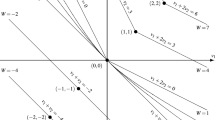Abstract
A definition of a social state is proposed that incorporates the notion of procedural fairness into Harsanyi's (1955) analytical framework. We show that, within the new framework, a Harsanyi-type social welfare function is immune to Diamond's (1967) criticism. Moreover, the resulting social welfare function embodies the notion of procedural fairness held by individual members of the society.
Similar content being viewed by others
References
Broome J (1984) Uncertainty and fairness. Econ J 94: 624–632
Broome J (1991) Weighing goods. Basil Blackwell, Cambridge
Chew S, Epstein LG, Segal U (1991) Mixture symmetry and quadratic utility. Econometrica 59: 139–164
Deschamps R, Gevers L (1979) Separability, risk-bearing and social welfare judgements. In: Laffont JJ (ed) Aggregation and revelation of preferences. North-Holland, Amsterdam, pp. 145–160
Diamond PA (1967) Cardinal welfare, individualistic ethics, and interpersonal comparison of utility: comment: J Polit Econ 75: 765–766
Epstein LG, Segal U (1992) Quadratic social welfare functions. J Polit Econ 100: 691–712
Grandmont JM (1972) Continuity properties of a von Neumann-Morgenstern utility. J Econ Theory 4: 45–47
Hammond PJ (1983) Ex-post optimality as a dynamically consistent objective for collective choice under uncertainty. In: Pattanaik PK, Salles M (eds) Social choice and welfare. North-Holland, Amsterdam, pp. 175–205
Harsanyi JC (1953) Cardinal utility in welfare economics. J Polit Econ 61: 434–435
Harsanyi JC (1955) Cardinal welfare, individualistic ethics, and interpersonal comparison of utility. J Polit Econ 63: 309–321
Harsanyi JC (1977) Rational behavior and bargaining equilibrium in games and social situations. Cambridge University Press, Cambridge
Harsanyi JC (1992) Game and decision theoretic models in ethics. In: Aumann RJ, Hart S (eds) Handbook of game theory with economic application, vol. 1. North-Holland, Amsterdam, pp. 669–707
Herstein IN, Milnor J (1953) An axiomatic approach to measurable utility. Econometrica 21: 291–297
Karni E, Safra Z (1995) Individual sense of justice and social welfare functions. Mimeo
Karni E, Schmeidler D (1994) Knowledge of justice. Johns Hopkins University, Working Papers in Economics 346
Machina MJ (1989) Dynamic consistency and non-expected utility models of choice under uncertainty. J Econ Literature 27: 1622–1688
Luce DR, Raiffa H (1957) Games and decisions: introduction and critical survey. Wiley, New York
Rawls J (1971) A Theory of justice. Harvard University Press, Cambridge
Samuelson PA (1952) Probability, utility, and the independence axiom. Econometrics 20: 670–678
Savage J (1954) The foundations of statistics. Wiley, New York
Sen AK (1970) Collective choice and social welfare. Holden-Day, San Francisco
Vickrey W (1945) Measuring marginal utility by reaction to risk. Econometrica 13: 319–333
Weymark JA (1991) A reconsideration of the Harsanyi-Sen debate on utilitarianism. In: Elster J, Romer JE (eds) Interpersonal comparisons of well-being. Cambridge University Press, Cambridge, pp. 255–320
Author information
Authors and Affiliations
Additional information
The author would like to thank Larry Epstein, Mark Machina, Zvi Safra, David Schmeidler, and Uzi Segal for very useful conversations, and John Weymark and two anonymous referees, for their valuable comments on an earlier version of this paper.
Rights and permissions
About this article
Cite this article
Karni, E. Social welfare functions and fairness. Soc Choice Welfare 13, 487–496 (1996). https://doi.org/10.1007/BF00182859
Received:
Accepted:
Issue Date:
DOI: https://doi.org/10.1007/BF00182859




